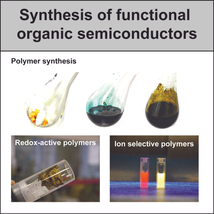Development of Polymer Batteries
In the Nelson group (Department of Physics, Imperial College London, UK), I utilized organic semiconductors in energy storage devices. We fabricated polymer batteries that could be operated in aqueous electrolytes and studied their properties. The aim of the project was to explore sustainable materials for energy storage applications in safe electrolytes (aqueous electrolytes). See the pictures below for how we fabricate and operate devices, read more about our work in the open-access article (link 1)

Polymer batteries in action:
We developed devices that could power small devices. See for yourself how our developed devices can power a fan, check out the color changes during the charging/discharging of the polymer which we use to monitor the state of charge of the device. This device was used during the Science Festival at Imperial College to explain concepts for energy storage devices.
Selected Publications:
Davide Moia*, Alexander Giovannitti*, Anna A. Szumska, Martin Schnurr, Elham Rezasoltani, Iuliana P. Maria, Piers R.F. Barnes, Iain McCulloch and Jenny Nelson*, A salt water battery with high stability and charging rates made from solution processed conjugated polymers with polar side chains, Energy Environ. Sci., 2019, 12, 1349-1357 [10.1039/C8EE03518K].
Anna A. Szumska, Iuliana P. Maria, Lucas Q. Flagg, Achilleas Savva, Jokubas Surgailis, Bryan D. Paulsen, Davide Moia, Xingxing Chen, Sophie Griggs, J. Tyler Mefford, Reem B. Rashid, Adam Marks, Sahika Inal, David S. Ginger, Alexander Giovannitti* and Jenny Nelson*, Reversible electrochemical charging of n-type conjugated polymer electrodes in aqueous electrolytes, J. Am. Chem. Soc., 2021, 143, 36, 14795–14805 [10.1021/jacs.1c06713].


